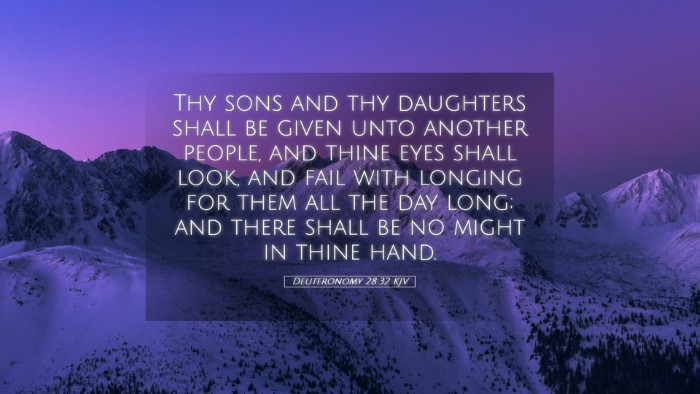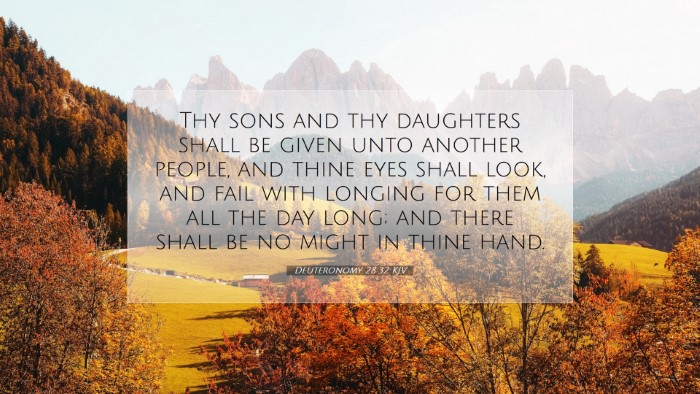Commentary on Deuteronomy 28:32
Verse Reference: Deuteronomy 28:32 (KJV)
Text: "Thy sons and thy daughters shall be given unto another people, and thine eyes shall look, and fail with longing for them all the day long; and there shall be no might in thy hand."
Introduction
This verse arises from the context of the covenant blessings and curses in the book of Deuteronomy, where God delineates the consequences of obedience and disobedience. The gravity of the warnings in Deuteronomy 28 shows the serious nature of Israel’s covenant with Yahweh, emphasizing that their faithfulness or lack thereof affects not only themselves but their descendants and their societal structure.
Contextual Analysis
Deuteronomy 28 delineates a clear dichotomy between blessings for obedience and curses for disobedience. Verses 15-68 articulate blessings that would accompany fidelity to God’s commands, while curses serve as warnings against unfaithfulness. Deuteronomy 28:32 poignantly addresses the severe losses Israel would face when they forsake God.
Historical Background
The Israelites, having been delivered from Egyptian bondage, were poised to inhabit the Promised Land. However, their potential failure to adhere to God’s law would expose them to dire consequences. This warning serves to remind the Israelites of their unique covenant relationship with God, and how their actions could lead to devastating outcomes.
Exegesis and Insights from Public Domain Commentaries
Matthew Henry's Commentary
Matthew Henry notes that this verse reflects the profound grief and distress that will accompany the separation from one's own children. He references the historical context where God's judgment would lead to the loss of offspring through exile or bondage. The phrase “given unto another people” implies a loss of familial integrity and stability, highlighting the painful repercussions of sin.
Henry emphasizes the emotional anguish conveyed in "thine eyes shall look, and fail with longing for them," indicating a deep yearning and helplessness. This speaks to the relational, societal, and individual breakdown that comes as a result of disobedience to God.
Albert Barnes' Notes on the Bible
Barnes expounds on the implications of the phrase “there shall be no might in thy hand.” This reflects the utter powerlessness that comes when God withdraws His favor. It signifies not merely a loss of physical ability or strength but indicates a broader impotence in the face of calamity, underscoring Israel's vulnerability without divine support. He connects this loss to the broader theme of exile and division among families in Israel, particularly when they fail to uphold their covenant with God.
Moreover, Barnes elucidates that the anguish felt by parents yearning for their children is a symptom of the broader disintegration of the community that results from forsaking the Lord. He asserts that such consequences serve as a solemn reminder to remain faithful to God’s commandments.
Adam Clarke's Commentary
Adam Clarke reflects on the concept of lost heritage, noting that “Thy sons and thy daughters shall be given unto another people” suggests a severance not only of familial ties but also of cultural identity and legacy. Clarke emphasizes this as a critical loss in the Jewish context, where lineage and inheritance were of paramount importance.
He also discusses the profound psychological impact indicated in the verse. The yearning expressed points to a deeper spiritual void and loss of identity experienced by those separated from their loved ones and homeland. Clarke’s insights remind readers of the holistic nature of God’s judgment— encompassing familial, societal, and spiritual dimensions.
Theological Reflections
This verse serves as a potent reminder of the consequences of covenant fidelity. Theologically, it raises questions about divine justice and mercy. It challenges believers to reflect on their own commitments and the potential ramifications for their families and communities.
Furthermore, the emotional appeal of the verse underscores God’s desire for a relationship with His people. The anguish over separation speaks to the covenant love inherent in God’s relationship with Israel. This invites pastors, theologians, and students to explore the themes of love, justice, and mercy in God’s character.
Practical Applications
Pastors and leaders can draw upon this commentary to develop teachings on the importance of spiritual leadership within families. The verse illustrates that one generation's disobedience can ripple through time, affecting future generations. Here, the focus might be on fostering a culture of faithfulness and holiness within the household.
- Understanding Consequences: Engage congregations in discussions about the real-life consequences of sin, not just on an individual level but on community and familial levels.
- Intercessory Prayer: Encourage prayer for families, particularly focusing on those who may be estranged or facing relational difficulties as a result of disobedience to God's will.
- Teaching Covenant Faithfulness: Develop lessons that highlight the importance of living out God’s commandments as a means of blessing future generations.
Conclusion
In summation, Deuteronomy 28:32 serves as a somber reminder of the ramifications of turning away from God’s commands. The insights from Matthew Henry, Albert Barnes, and Adam Clarke collectively point to the multifaceted implications this verse has on familial relationships and societal constructs.
Through careful adherence to God’s word, communities can thrive and avoid the desolation that comes with disobedience. It calls for introspection and reinforces the necessity of maintaining a fervent commitment to God’s covenant, thus ushering in blessings that extend beyond individual lives to encompass families and generations.


